If you don’t have access to extensive trails or arenas, you may find yourself riding your horse on the road. It’s a great way to take your equestrian endeavors off-property and explore country lanes.
Can you ride a horse on the road?
In most places, it is legal to ride your horse on the road. However, it’s important to be aware of local equine and traffic laws. This care is essential for the safety of both you, your horse, and those around you.
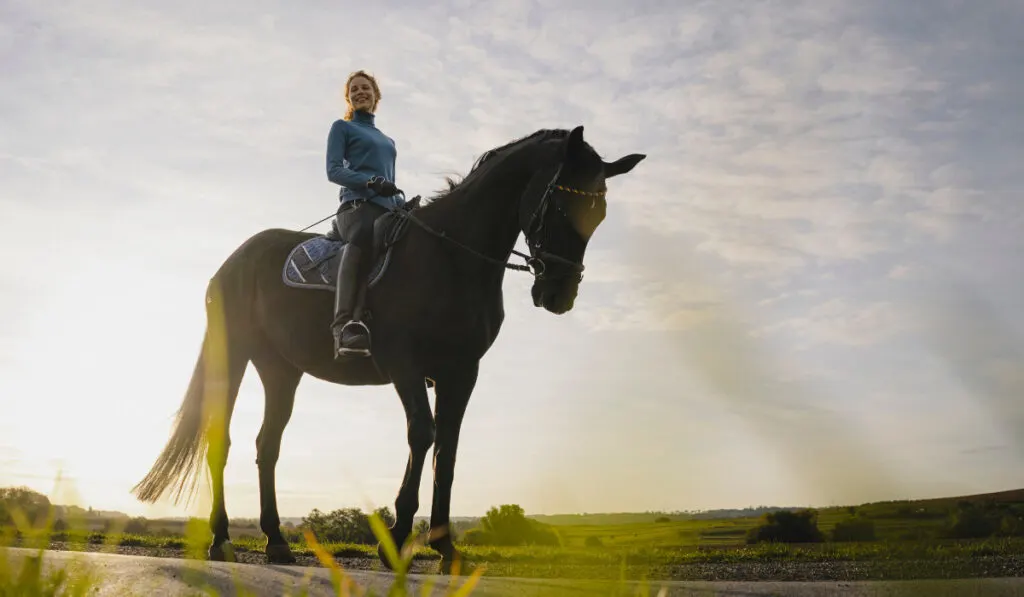
In this article, we delve into the topic of riding horses – roads, highways vs. street use. You’ll learn important safety tips and legal rules to help you ride your horse safely and responsibly in these places. (Source)
Table of Contents
Key Takeaways: Can You Ride a Horse on The Road
- Legalities and Licenses: While riding a horse on roads is generally legal, specific regional laws exist. For activities like driving a buggy or leading trail rides, a license might be required. Always check local regulations for clarity.
- Horse vs. Vehicle Laws: Horses are often treated as livestock under the law, but when ridden or driven on roads, they must adhere to traffic laws, including specific rules for bridges and highways. Understanding these distinctions is crucial for legal compliance and safety.
- Safety Tips: Essential for both rider and horse safety, key guidelines include obeying traffic signs, using equestrian crossings, and avoiding prohibited areas like highways. Riders are advised to follow traffic flow and ride in a single-file line where applicable.
Is it Illegal to Ride a Horse on the Road?
Each state, county, and town has its own rules about riding a horse on the road. No federal laws stop you from taking your horse on city streets, but make sure you check local rules.
Horse as Vehicles vs. Horse as Livestock
Most horse laws treat them as livestock, covering their care, slaughter rules, and accident liability. However, these laws mostly apply to horses used in equine activities or as loose herds. Horses on the road, whether ridden or driven, follow traffic laws and must share the road with cars.
Individual rules can vary from region to region with regard to exactly when and where you can ride, but for the most part – it’s legal to ride your horse on the road except where expressly forbidden.
Horse-drawn carriages and sleighs are considered “slow-moving vehicles,” and are also governed by traffic laws. However, there are some exceptions for carriages – usually regarding tourism. For example, you can usually drive your own horse and buggy down the road to the corner store, but you may need a specific commercial license if you want to pick up passengers.
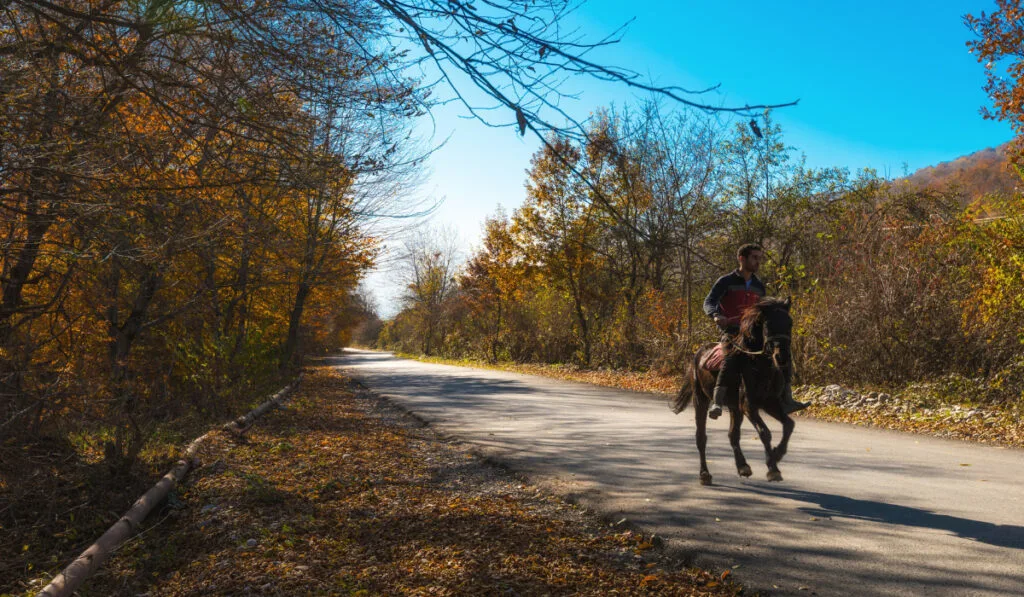
Equine and Equestrian Licensing: Regulations for Riders and Horses
Riding a horse doesn’t require a license. But, for driving a buggy, leading a trail ride, or carrying passengers, you might need one. If you’re just planning to enjoy trail riding – even on road sections – you don’t need a license.
Traffic Rules for Drivers
Many states have laws in place to protect horseback riders on roadways. Here’s an example from New Hampshire:
“Every person having control or charge of a vehicle shall, whenever upon any way and approaching any horse, drive, manage, and control such vehicle in such a manner as to exercise every reasonable precaution to prevent the frightening of such horse, and to insure the safety and protection of any person riding or driving the same.”
(source)
Generally, vehicles should give way to riders and avoid scaring horses. Sharing the road is a good idea to keep it safe.
Traffic Rules for Riders
Riders should follow traffic laws and signs. Highways, train paths, and many bridges are off-limits.. Use equestrian crossings wherever possible, and avoid busy intersections.
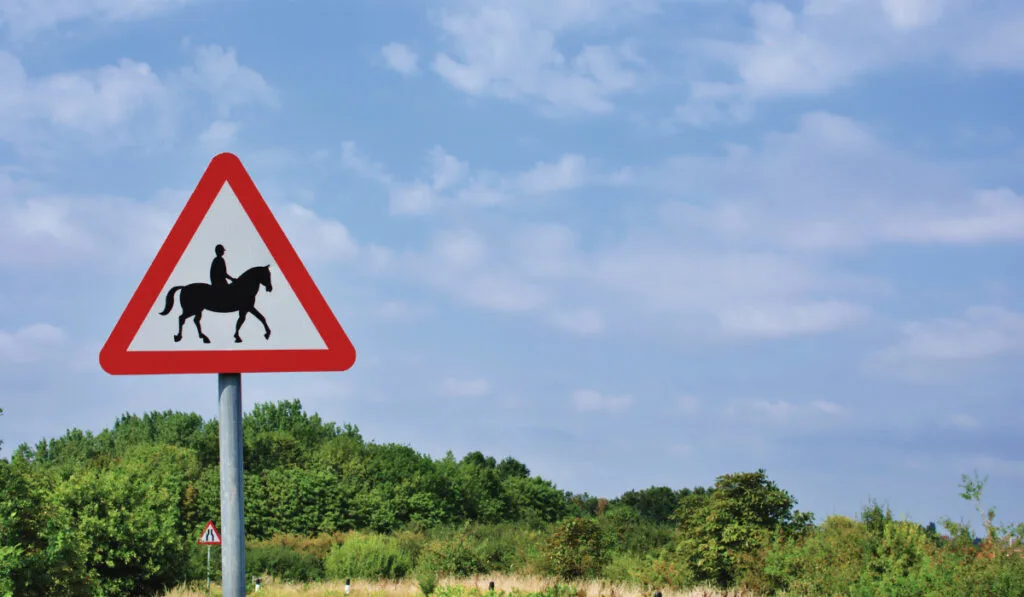
Most states specify that you should ride on the right-hand side of the road with the flow of traffic (except in Colorado, where you must ride on the left). Ride in a single-file line if you’re in a group, and stay as near to the shoulder as you can. (source)
When and Where It Is Illegal to Ride
While there are few laws expressly forbidding riding on a road, remember to pay attention to the specific rules of your area. Here are some examples of applicable traffic laws (although this is far from an exhaustive list) (source):
- Louisiana: Don’t tie your horse to a tree on the highway, or let him stand in a way that endangers it (the tree, not the horse). Riding is also not permitted on paved highways.
- Alabama: Don’t stake your horse or other livestock animals on the right-of-way on a highway.
- Idaho, Mississippi, Pennsylvania: You must cross bridges at a gait no faster than a walk. (Fun fact, the fine for breaking Mississippi law from 1857 is $5 – unless there’s no posted sign, and then the fee is waived). (source)
- Nevada: No “reckless” riding.
- Kentucky, New Jersey Pennsylvania, New York: No racing on the highways.
- Kentucky: Don’t ride your horse on a levee. Try to use horse trails instead.
Most states don’t ban highway riding, but in order to be safe, follow road rules as highways often exclude horses.
Always follow signs when riding – it’s important for everyone’s safety. Use equestrian crossings when applicable, and avoid riding on areas designated for pedestrians only (such as sidewalks).
In What States Can You Ride Horses in Roadways – State-by-State Guide
Navigating your state’s laws and statutes can be a tricky business. While consulting a lawyer is your best bet, you really just need to do a quick search to find out if there are any unique laws in your area.
This table provides a link to the search page for each state’s legislature. When searching for traffic statutes, use terms like “animal riding,” “horse riding,” “horse,” “livestock,” or “non-motorized vehicle” to get the best results.
If you find your state’s website too unwieldy to navigate, you can also try Michigan State University’s Legal and Historical Animal Center (starting with these horse-related statutes). You can also try https://lp.findlaw.com/ to search for more specific laws in your area.
Even if you don’t understand all the fancy legalese, just know that it’s pretty much legal in most places to ride your horse on the road – as long as you’re being safe about it.
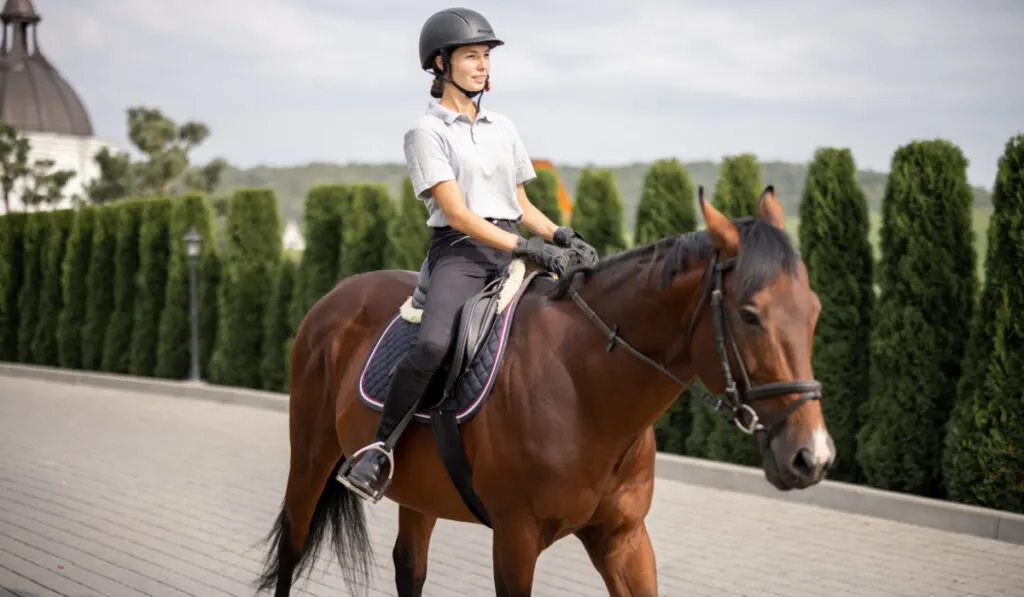
Safety First
Even if you have a legal right to be on the road, always take safety precautions when sharing the road with motor vehicles. Here are some basic tips (source):
- Stick to appropriate trails and bridle paths as much as possible, and avoid roads if you can. It’ll be better for your horse’s feet, trails and bridlepaths are often designed with your horse in mind and you can avoid speeding cars and trucks.
- Plan ahead. If roads are necessary, pick routes with less traffic, wide shoulders, and clear visibility.
- Wear bright, reflective clothing. Now is the time to break out the flashiest gear you can find. Wearing bright clothes makes it easier for drivers to see you and prevents accidents.
- Train your horse well before taking him on the road. If you plan to ride on the roads often, take the time and desensitize your horse to common sights and sounds, and teach them to handle spooking without tossing you into the street. (source)
- Use the buddy system, and always wear your helmet.
Learn more about good and safe riding equipment in our article on horse saddles!
Avoid Dangerous Situations
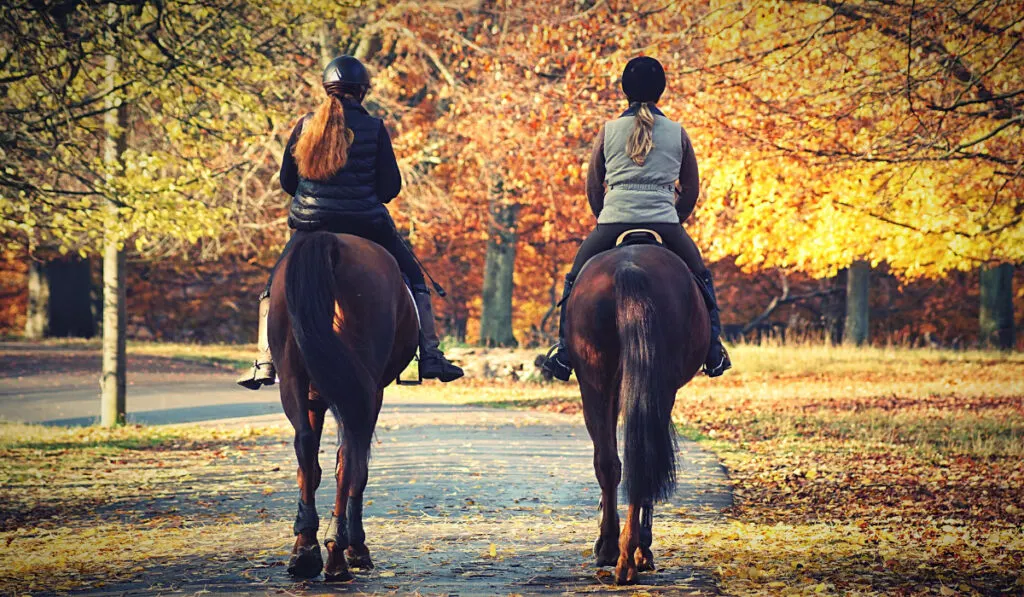
While your horse must obey traffic laws, you won’t get tickets for speeding or running red lights while riding legally. However, there are still consequences for riding your horse recklessly or breaking explicit traffic laws.
Learn about dangerous horse breeds, and their traits to avoid risks.
Don’t drink and ride – Horseback Riding Under the Influence
Most DUI and DWI laws apply to people operating a motor vehicle while under the influence, which may or may not apply to riding a horse.
In some states, people have been charged and convicted of driving under the influence or driving while intoxicated (including California, Texas, and Florida) while riding their horse drunk.
In some states, riding a horse after drinking may lead to charges like public intoxication, even if it’s not against traffic laws. (source)
Texting While Horseback Riding
In today’s tech-savvy society, the same laws would probably apply to texting or using the phone while riding as they do while driving (which can vary greatly from state to state).
Generally speaking – if it’s illegal for drivers to do it, then consider it illegal for equestrians on the road as well.
Other Legal Consequences
Even if you can’t be charged with a DUI/DWI, you should still avoid doing anything that could compromise the safety of you or your horse.
If an incident occurs, you could be liable for damage that happens to someone’s property or vehicle. You could also be charged with animal endangerment, public endangerment, or public intoxication if you’re caught riding your horse while under the influence. (source)
Frequently Asked Questions (FAQ):
Can You Ride a Horse on the Road at Night?
Yes, you can ride a horse on the road at night, but it’s crucial to follow safety regulations and ensure visibility, such as using reflective gear and lights, for both rider and horse.
Do You Need Insurance for Horseback Riding on the Street?
While insurance requirements may vary by location, it’s generally a good idea to have liability insurance when horseback riding on the street to protect against potential accidents or injuries. Check your local regulations and consider consulting with an insurance provider for specific guidance.
Riding a Horse in Urban and Rudal Area – What’s the Main Difference?
The main difference between riding a horse in urban and rural areas lies in the environment and potential hazards. In urban areas, you’ll encounter traffic, pedestrians, and more regulations, so it’s essential to follow road laws.
In urban areas, local laws often limit or ban street horse riding for safety reasons. It’s essential for riders to be aware of and comply with these regulations when riding in urban environments.
For updated information on highway code changes for horse riding, you can check Enable Law.
Resources
https://ronaustinlaw.com/blog/2019/8/20/want-to-take-your-horse-down-an-old-town-road-in-louisiana

